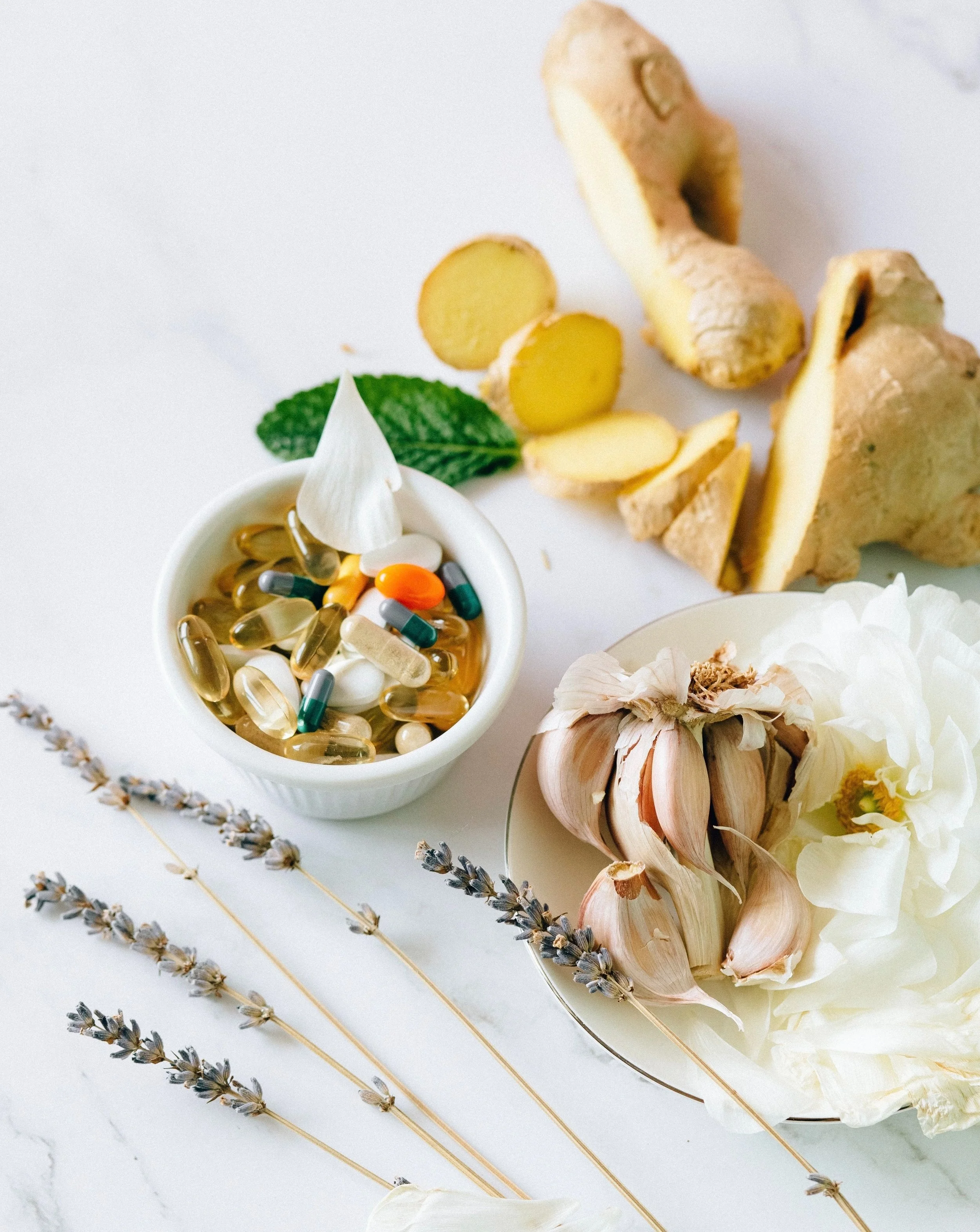Herbal Supplements and Heart Medications: A Dangerous Mix
By Kate Byrd
Over 50% of Americans and nearly 70% of older persons use herbal supplements. People often think herbal remedies are safe because they're natural. That's not always true. Herbal products can powerfully affect the body and interact with prescription drugs. When combined with heart medications, the results can be life-threatening.
Understanding Heart Medications
Doctors prescribe heart medications to treat conditions like high blood pressure, heart rhythm disorders, and heart failure. These drugs work in different ways to prevent heart attack, heart failure, and strokes by:
Lowering blood pressure
Regulating heart rhythm
Improving heart function
Preventing blood clots
Common Herbal Products People on Heart Medication Should Avoid:
St. John's Wort (Hypericum perforatum)
Mainly used as an herbal remedy for depression and anxiety, St. John's wort keeps some heart drugs from working as well as they should. Avoid St. John's Wort if taking any of these medications:
Calcium channel blockers, such as diltiazem (Cardizem and others), nifedipine (Procardia), and verapamil (Calan SR or Verelan)
Amiodarone (Cordarone)
Digoxin (Lanoxin)
Warfarin (Coumadin or Jantoven)
Licorice Root (Glycyrrhiza glabra)
Licorice has long been used to treat indigestion, cough, and bronchitis. However, high doses can cause high blood pressure, water retention, and heart rhythm issues. Anyone with heart problems shouldn't take licorice. If you take any of the following drugs, avoid licorice:
Digoxin (Lanoxin)
Warfarin (Coumadin or Jantoven)
ACE (angiotensin-converting enzyme) inhibitors such as enalapril (Vasotec), lisinopril (Prinivil, Zestril), or benazepril (Lotensin)
Loop Diuretics such as furosemide (Lasix) or bumetanide (Bumex)
Danshen (Salvia miltiorrhiza)
Danshen is an herb used in traditional Chinese medicine for circulation problems and diseases of the heart. Also known as Chinese red sage, it appears to thin the blood and widen blood vessels to improve circulation. Danshen may interact with heart medications such as:
Aspirin
Clopidogrel (Plavix)
Warfarin (Coumadin and Jantoven)
Digoxin (Lanoxin)
Beta-blockers such as atenolol (Tenormin), metoprolol (Lopressor, Toprol-XL), and propranolol (Inderal)
Calcium channel blockers such as amlodipine (Norvasc), diltiazem (Cardizem), and nifedipine (Procardia)
ACE (angiotensin-converting enzyme) inhibitors enalapril (Vasotec), lisinopril (Prinivil, Zestril), or benazepril (Lotensin)
Angiotensin receptor blockers (ARBs) such as Losartan (Cozaar) and valsartan (Diovan)
Diuretics such as furosemide (Lasix) and hydrochlorothiazide (HydroDIURIL)
Hawthorn (Crataegus genus)
In traditional use, hawthorn treats digestive, heart, and kidney diseases. Hawthorn may interfere with these heart medications:
Beta-blockers such as atenolol (Tenormin), metoprolol (Lopressor, Toprol-XL), and propranolol (Inderal)
Calcium channel blockers such as amlodipine (Norvasc), diltiazem (Cardizem), and nifedipine (Procardia)
Digoxin (Lanoxin)
Nitrates such as nitroglycerin (Nitrostat, Nitro-Dur, others) and isosorbide (Isordil, Bidil)
Ginkgo (Ginkgo biloba)
Ginkgo has been used in Chinese medicine for centuries to improve memory and decrease fatigue. Ginkgo supplements may cause increased bleeding, especially if taken with these blood-thinning drugs:
Aspirin
Clopidogrel (Plavix)
Warfarin (Coumadin and Jantoven)
Garlic (Allium sativum)
This common kitchen herb is known for its anti-inflammatory and antioxidant properties. But in high doses, garlic may raise the risk of bleeding if you take a blood thinner, such as:
Aspirin
Clopidogrel (Plavix)
Warfarin (Coumadin and Jantoven)
Ginger (Zingiber officinale)
Ginger is a popular spice for relieving nausea, vomiting, and menstrual cramps. In supplement doses, it may increase the risk of bleeding if you take a blood-thinning drug such as:
Aspirin
Clopidogrel (Plavix)
Warfarin (Coumadin and Jantoven)
Ginseng (Panax ginseng)
It is widely believed that ginseng can improve stamina, focus, and cognitive function. Unfortunately, ginseng interferes with blood clotting. Avoid taking ginseng if you take these medications:
Aspirin
Clopidogrel (Plavix)
Warfarin (Coumadin and Jantoven)
Evening Primrose (Oenothera biennis)
Evening Primrose oil is a traditional remedy for dry skin, menopause symptoms, and premenstrual syndrome. It may also cause increased bleeding, especially if taken with these medications:
Aspirin
Clopidogrel (Plavix)
Warfarin (Coumadin and Jantoven)
Be Safe With Herbal Supplements
To lessen the risks of interactions between heart medicines and herbal supplements, be sure to do the following:
Consult your pharmacist or healthcare provider:
Ask your healthcare provider before starting any herbal supplement, especially if you take heart medications. They can assess potential interactions and provide guidance on safe usage.
Tell your pharmacist or healthcare provider:
Ensure to inform your healthcare provider about any herbal supplements you take, including dosage and frequency. This information can help them determine any risks and adjust your heart medications.
Monitor for side effects:
Keep track of any changes in your health after starting an herbal supplement. Report any of these symptoms to your healthcare provider promptly:
Dizziness
Weakness
Lightheadedness
Unusual swelling
Headache
Heart palpitations
Increased bleeding or bruising
Buy quality herbal supplements:
While herbal supplements seem safe, their unregulated production can lead to variations in ingredients and doses. Purchase supplements from reputable sources and read product labels carefully.
In Conclusion
Many herbal products don't mix well with prescription heart medications. Yet only 25% of people taking herbal remedies tell their healthcare providers. Interactions between heart drugs and herbal supplements can have unintended and harmful effects.
Consulting with healthcare providers and closely monitoring changes assures the safe and effective use of medications and supplements. Remember, when it comes to your heart health, informed decision-making is essential.


